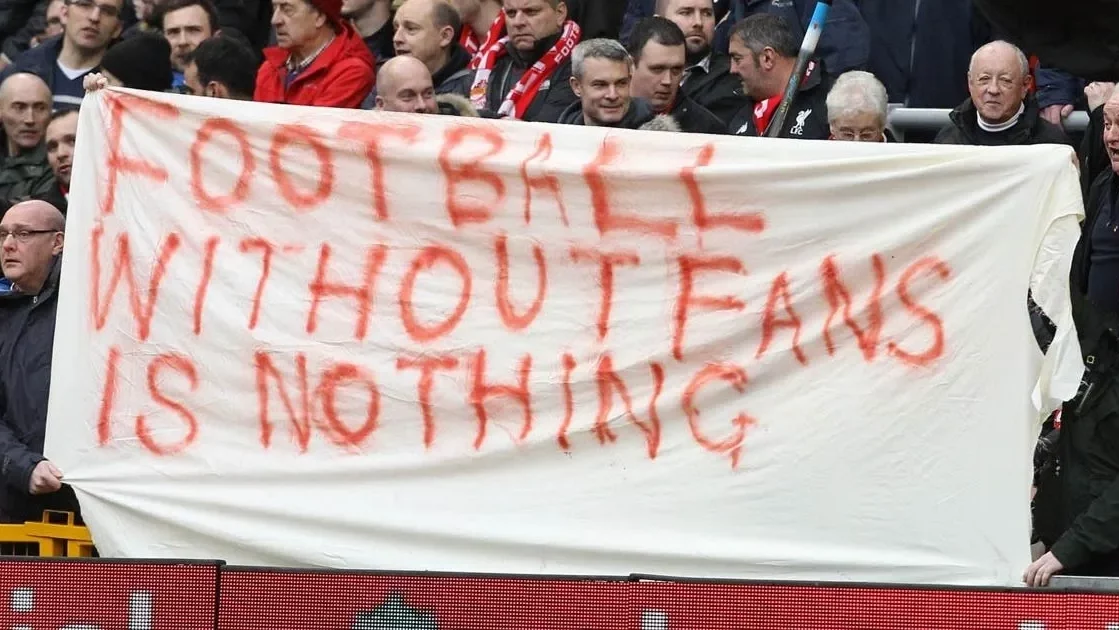This season, 90% of Premier League clubs have a gambling sponsor or partner. This arrangement gives gambling operators a vehicle to normalise and advertise addictive products in front of billions of fans across the globe, including millions of children and young people.
Words by Tom Fleming
We are calling for an end to all gambling advertising and sponsorship in football. Here are 10 (of the many) reasons why we need to kick gambling adverts out of football:
To stop the normalisation of gambling to young people
We’ll start with an obvious one. The constant and ominous presence of gambling adverts and brands in football, which is by far the world’s most popular sport, normalises gambling to billions across the globe, including millions of young people. A study by Deakin University showed that children now think that gambling adverts are just a normal part of watching sport.
Read more: Gambling and football: a toxic relationship

So that children can wear the same shirt as their heroes
In the UK, if you are a child who supports a team with a front-of-shirt gambling sponsor, then due to legal reasons the youth version of the kit will have a different sponsor, or even no sponsor at all. This means that millions of children can’t wear the same shirt as their footballing heroes.

To stop murky ‘white label’ deals
If you watch much Premier League football, there’s no doubt you’ll doubt have noticed a few gambling adverts for companies that you haven’t seen on the high street. W88, ManBetX and Fun88, to name but a few, are all ‘white label’ brands based in Asia, that use the Premier League as a billboard to advertise to Asian fans in countries where gambling is often illegal.
Many of these ‘white label’ brands aren’t even trying to engage with the UK market, and don’t even have websites that you can legally access from the UK. Very little is known about these ‘white label’ companies, or if they are properly regulated.
Read more: The trillion-dollar gambling game, by Philippe Auclair

Football isn’t as dependent on gambling money as you might think
The gambling industry want you to think they are single-handedly keeping football afloat. However, the reality is very different. As an example, the total wage bill in the Championship is around £900m per season, with gambling sponsorship bringing in £30m during the same time – just 3.3%. A recent report found that a ban on gambling sponsorship in football would amount to just a 2.5% revenue decrease for the clubs – a price well worth paying.
Read more: Peers for Gambling Reform’s economic assessment of selected House of Lords reforms

Because fans don’t want them
Again, despite what the gambling industry want to you think, gambling adverts are overwhelmingly unpopular with fans. A recent survey found that two-thirds of fans asked felt there were too many gambling adverts related to football on TV, whilst around a third said they were less likely to buy kits with a gambling sponsor. In fact, at the end of the 2019–20 season, Everton and Aston Villa ditched their gambling shirt sponsors (SportPesa and W88). Both clubs signed deals with Cazoo, a digital car sales platform, to become their main shirt sponsor, which led to a 60% rise in shirt sales for Everton and a 50% rise for Aston Villa!

Because shirts and stadiums – and sound – look better without them
Cast your mind back to yesteryear and the iconic shirts of the 90s and early noughties, and the chances are you won’t be picturing a shirt with a gambling logo on it. Old footage of classic matches looks so much better when stadiums came without the dark nudge to gamble constantly flashing up around the side of the pitch. We’re sure we’re not alone in thinking that the Britannia Stadium sounds better than the Bet365 stadium either.

It will remove a risk factor for those of us in recovery
For millions of people in recovery from gambling disorder across the world, something as simple as watching a game of football can be a very difficult experience. Players and coaches dressed in clothes adorned with gambling brands, pitch-side adverts constantly nudging them to gamble – banning advertising and sponsorship would help protect and sustain our recoveries.

So healthier, sustainable industries can compete
Gambling companies tend to secure sponsorship deals by offering more money than competitors and pricing them out of any potential deals. Removing gambling sponsorship would give other companies advertising healthier, more beneficial and sustainable products a chance to reach more people so that more people can benefit from their products.
Forest Green Rovers, for example, have pledged not to take gambling sponsorship money, and are sponsored by Ecotricity, which founded the global green energy movement, and Sea Shepherd, a non-profit marine organisation.

To follow the lead of other countries
Earlier this year, Spain announced a ban on gambling advertising and sponsorship in football, with a minister recently tweeting: “Tonight the ban on gambling and betting advertising comes into force. It has not been easy. Soccer and the rest of the competitions will be healthier, cleaner and in accordance with the values of the sport.”
However, Spain wasn’t the first country to ban gambling advertising. Italy, Belgium, Lithuania and Australia have all restricted or banned gambling advertising in recent years, with the aim of reducing gambling-related harm and improving public health.

To avoid another Football Index-style disaster
Earlier this year, Football Index collapsed. The company had marketed itself as a safe platform where customers can buy and sell ‘shares’ in players that increase or decrease over time, instead of a ‘normal’ gambling platform. Football Index were the front-of-shirt sponsor for several teams, including Queens Park Rangers and Nottingham Forest. This exposure legitimised their platform, making it appear safe. However, when the company collapsed, its customers lost vast sums of money and suffered harm.

To prevent harm, addiction and to save lives
Last, and by no means least, kicking gambling adverts out of football would prevent gambling-relation harm, reduce the amount of people suffering with gambling disorder, and save lives. Gambling operators pay to sponsor and advertise in football because they know that it is effective and increases consumption of a dangerous product – one in four gamblers experiences harm. Therefore, removing advertising would decrease gambling activity and gambling-related harm.

If you haven’t already, please sign our petition and add your voice to over 12,000 others.
Thank for your support.


